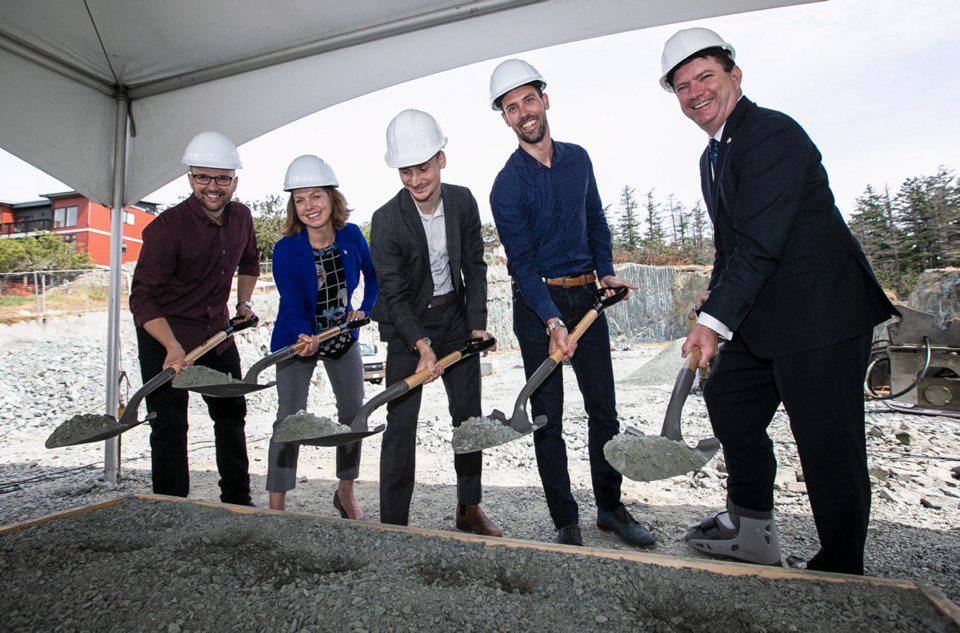Greater Victoria housing starts are trailing last year as the pace of new homebuilding moderates in the capital region.
“June total housing starts in Metro Victoria were less than half of the levels from one year ago,” Braden Batch, Canada Mortgage and Housing Corporation’s analyst for Vancouver Island, said Tuesday. “However, year-to-date total starts were only nine per cent below the 2018 level.”
In the capital region in June, a total 219 homes were started, down from 512 for the same month last year, the federal agency said. However, many new units are on their way in the region. Nearly 6,000 units are currently under construction.
The West Shore remains a hotbed of home construction, with 2,547 homes going up, including 1,837 apartment-style units.
“Completions of new units have yet to follow the record-setting pace of starts over the last two years, and a cyclical slowdown in starts is in line with CMHC’s housing market outlook for Victoria,” Batch said.
“Single detached starts were down by nearly a third from the previous year, as demand for these homes at current prices has weakened.”
The figures were released on the same day of a ground-breaking for 48 new rental homes at 284 Belmont Rd. in Colwood.
The province is partnering with developer Stride Properties Ltd. to build the homes in a four-storey multi-family project.
Units will be available for households with annual incomes of between $52,000 and $66,000. The province is providing $9.7 million in interim construction financing to improve the supply of affordable rental housing. One-bedroom units will rent for about $1,300 per month and two-bedroom units will be $1,650 per month. Completion is expected in late 2020.
“These 50 new homes for middle-income families will increase the diversity of housing choice in Colwood,” said Rob Martin, mayor of Colwood.
“We want Colwood residents to be able to live in our community throughout their lives, and that includes having affordable rental options for young adults, families starting out and people on fixed incomes.”
Matt Peulen, president of Stride Properties Ltd., said: “Housing affordability is an ongoing concern, and we are happy to be working with B.C. Housing to add rental homes in our community.”
Across Canada, the annual pace of housing starts picked up in June, the latest piece of economic data to paint a picture of a stronger second quarter.
CMHC said Tuesday the pace of housing starts rose to a seasonally adjusted annual rate of 245,657 units compared with 196,809 units in May.
The result topped the 210,000 units that economists had expected, according to Thomson Reuters Eikon.
Robert Kavcic, senior economist at BMO Capital Markets, said the result was yet another factor helping to drive a strong rebound in second quarter growth. “Residential construction activity remains rock solid, as still-strong demographic flows are supporting unit demand,” Kavcic wrote in a note.
The increase in the pace of home starts came as the rate of urban starts increased by 26 per cent in June to 234,238 units.
The annualized pace of multiple-unit projects such as condominiums, apartments and townhouses increased by 31 per cent to 185,804 units last month, while the pace of single-detached urban starts rose eight per cent to 48,434 units. Rural starts were estimated at a seasonally adjusted annual rate of 11,419 units.
TD Bank economist Rishi Sondhi said new home construction in Canada has continued to hold up well, in contrast to the home resale market.
“That said, starts are moving gradually lower on a trend basis, with the six-month average well off its near-term peak observed in late 2017,” Sondhi wrote. “We anticipate some further moderation, as starts move closer to a more fundamentally supported level of around 200,000.”
The six-month moving average of the monthly seasonally adjusted annual rates was 205,838 units in June compared with 200,530 in May.
In a separate report, Statistics Canada said Tuesday the value of building permits issued in May fell to $8.2 billion compared with a record $9.5 billion in April.
The drop came as the value of permits for multi-family dwellings in B.C. fell following a significant rise in April in response to impending increases in development costs.



